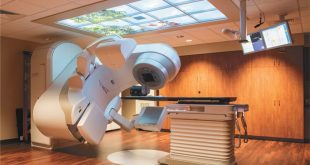By Dr. Lourdes M. Pelaez-Echevarria, DO
Colorectal cancer surgery and the use of robotics are near and dear to my heart due to the advancements and ability to treat cancer so effectively. Years ago, colorectal surgery was an invasive procedure that made large incisions from stem to stern, which was debilitating for patients. They were left to recover in the hospital for a week and do the “old man shuffle” due to their pain.
Today, we’ve come so far. Along with minimally invasive procedures to treat colorectal cancer through laparoscopic procures, we now have the technologically innovative robotic advantage. For robotic colorectal surgery, recovering time will depend on the area of the body the procedure is being done on. Patients heal and recover more quickly when using robotic surgery than with traditional surgery and with significantly less pain.
Robotic surgery makes me a more precise surgeon, as the images of the rectum and colon are magnified 20x larger than normal, which allows us to see tiny details and make intricate movements with the instruments.
Twenty-one years ago, when I was doing my fellowship, the first robotic system came on the market. It was bulky and unrefined, but through the past several decades, the technological advances, upgrades, and superiority of robotics are astonishing. It’s truly a game-changer.
We can now utilize TAMIS, which is transanal minimally invasive surgery on many patients with robotics. TAMIS allows us the advantage of removing tumors and polyps transanally as opposed to incisions. The instruments are so small that we are now able to provide this cutting-edge technology to reach polyps or early cancers in areas that previously would have required a large incision.
Colorectal cancer is the second most common cause of cancer and the third leading cause of death in younger adults. Although it’s commonly seen in people over the age of 50, it is increasingly showing up in younger patients; much of which is due to lifestyle choices as well as genetics. If you have symptoms, you must see your physician. Sadly, many people are still uncomfortable discussing their bleeding, pain, leakage, or other symptoms with their provider. Diagnosing it early saves lives.
Due to the increase in awareness and education on getting colonoscopies, there is a significant decrease in the number of deaths from colorectal cancer. If caught early, your chances of survival are better. For localized cancer, there is a 91% 5-year survival rate; for regionalized cancer, it’s 72%, and for distant metastasized cancer, it is only 14%.
Surgery increases the survival rate when colorectal polyps or tumors are caught early.
Considering the number of COVID cases and deaths compared to colorectal cancer, the numbers are staggering. For instance, in the U.S., in 2020, there were 147,950 diagnoses for colorectal cancer; of those, approximately 53,000 resulted in deaths (NOTE: The final numbers from 2020 are still being tabulated). In New York last year, COVID claimed 53,664 deaths. In Texas, it claimed 53,081 deaths, and in Florida, 41,130. Nationally, COVID resulted in 1.7% deaths; in Florida, it was 1.3%, and nationally for colorectal cancer, that percentage is very high at 9%. This is six times the death rate of COVID.
This is why it’s critical to be proactive and get screenings and incorporate healthy lifestyle choices, including a nutritious diet, exercise, limiting alcohol consumption, and quitting tobacco use.
There are other alternatives or additional ways to check for polyps or abnormalities, such as colorectal stool cards and CT virtual colonoscopies. Neither of these is nearly as effective as a colonoscopy, but they are better than nothing at all, especially for those adults with no risk factors. If, however, you have a positive report on the stool cards or your CT shows polyps, you will be referred for a colonoscopy. Most polyps are removed during the colonoscopy, so it’s very convenient and beneficial for the patient to go with the “gold standard,” which is a colonoscopy.
Lourdes M. Pelaez-Echevarria, DO
Dr. Lourdes Pelaez-Echevarria is a board-certified general surgeon, serving the New Port Richey, Florida area for BayCare Medical Group. She completed her undergraduate degree from the University of Florida in Gainesville, Florida. She earned her Doctor of Osteopathic Medicine from Nova Southeastern University College of Osteopathic Medicine in Fort Lauderdale, Florida.
Dr. Pelaez-Echevarria continued her medical education by completing a general and vascular residency at Rowan University in Stratford, New Jersey, followed by a minimally invasive surgery fellowship at Baptist Health System/HealthSouth Doctors Hospital in Miami, Florida. Dr. Pelaez-Echevarria takes her job seriously and realizes that she has an awesome responsibility to all her patients. Putting their needs first lays the foundation for everything else to fall into place. She is an accomplished and responsible general surgeon who specializes in robotic, breast, colon and rectal surgery and minimally invasive surgery.
Dr. Pelaez-Echevarria recognizes that every patient is different and not everybody follows the rules. She relies on her great interpersonal skills and abilities to provide excellent surgical care. As a general surgeon, she can cut out cancers, remove infected/broken organs, mend bowels and fix hernias, often using a surgical robot. She is a member of the American Osteopathic Association and the American College of Osteopathic Surgeons, speaks Spanish and affiliated with Morton Plant North Bay Hospital.
BayCare Meduical Group
6633 Forest Ave., Suite 205
New Port Richey, FL 34653
(727) 375-2849 | DrLourdesPelaez.org
 Central Florida Health and Wellness Magazine Health and Wellness Articles of the Villages
Central Florida Health and Wellness Magazine Health and Wellness Articles of the Villages



